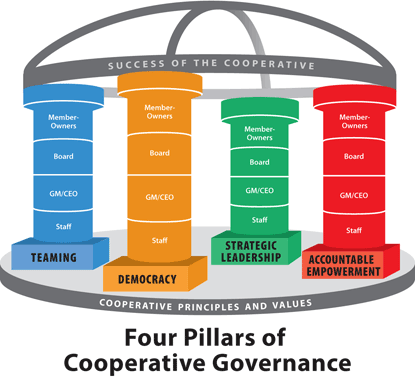Great leaders demonstrate how to be a force for good in local communities and beyond. Our cooperative heroes—the Rochdale Pioneers—were striking weavers who opened a grocery co-op in 1844 in Rochdale, England, to help themselves and others get free from indebtedness to the company store.
The Pioneers asked and answered some compelling questions: Shouldn’t the economy serve the people rather than the people serve the economy? What does it look like when that happens? Their belief in economic equity and fairness led to the worldwide consumer cooperative movement.
In keeping with the Rochdale Pioneers’ vision, and a well-defined current global need for financial and environmental -stability, the International Cooperative Alliance (ICA) in 2012 outlined a strategic agenda for cooperatives.
At the same time, the present authors had been asking ourselves whether there should be a model of cooperative governance, and if so, what would it need to look like to support and drive forward the success of our cooperatives?
Tools for cooperatives
Co-ops have many governance tools at their disposal that have served them well, such as Policy Governance, a system for defining Ends and clarifying roles and structure for organizing the board’s work. Over the last decade, co-op boards have been strengthened by a solid focus on Ends accomplishment and good process and systems. This has helped create positive and effective relationships with general managers. We have seen the outcome this has had on both business growth and social impact in our movement.
However, the cooperative boardroom does not share all the same purposes as the boards of investor-owned corporation or nonprofits. Co-ops are organized to benefit their owners, and that is more important than a financial return on investment. We concluded it was time to re-create our understanding of cooperative governance.
Last spring, one of the authors, Art -Sherwood, was invited to be a visiting scholar to address our questions at the world-renowned Vincent and Elinor Ostrom Workshop on Political Theory and Policy Analysis at Indiana University. Based on Nobel Prize Laureate Elinor Ostrom and Vincent Ostrom’s work, Sherwood conducted research addressing the expectations we have of cooperative governors and how this might differ from investor-owned corporations.
Based on the results of this research (see References) and our team’s deep experience with cooperative leadership, we designed the Four Pillars of Cooperative Governance model. We have since presented it at the International Cooperative Governance Symposium in Halifax, Nova Scotia, and we explain the model below.
Four Pillars of Cooperative Governance
Cooperative governance is the act of steering cooperatively owned enterprises toward economic, social, and cultural success. It consists of answering key questions, defining roles and responsibilities, and establishing processes for setting expectations and ensuring accountability.
A model is a way of framing so that the parts and processes make sense. Our Four Pillars model is a not about changing systems but is a new way of making sense of cooperative governance. We think it addresses current gaps in strengthening owner relationships and democratic practices that are not clearly part of other business or governance models. The Four Pillars of Cooperative Governance are:
Teaming: successfully working together to achieve common purpose.
Accountable Empowerment: successfully empowering people while at the same time holding them accountable for the power granted.
Strategic Leadership: successfully articulating the cooperative’s direction/purpose and setting up the organization for movement in this direction.
Democracy: successfully practicing, protecting, promoting, and perpetuating our healthy democracies.
Within a co-op, no matter what the role, the expectation is that everyone is responsible for working together effectively, to be accountable and able to empower others, to be focused on purpose, and to participate in ensuring a healthy democracy. It is what co-ops are working to achieve, not only in the boardroom but also in the workplace and with members in the co-op. Governance—steering, making key decisions, working together for common goals—happens throughout the co-op at every level.
Therefore, the Four Pillars of Cooperative Governance is a framework for connecting the co-op’s values to governance activities at all levels: staff, management, board, and owners. Each of the four pillars—Teaming, Accountable Empowerment, Strategic Leadership, and Democracy—is relevant to each constituency in a co-op. Again, Four Pillars of Cooperative Governance is not about changing systems, but a new way of thinking about the role of governance in a co-op.
Four pillars at the board level
The remainder of this article will focus on understanding cooperative governance at the level of the board of directors. The work that co-op boards are charged with (stewardship of a community-owned asset) is being carried out, but it is currently missing a framework for directors to easily define it and have a vocabulary for it.
We need to build on what we’ve learned about effective governance to demonstrate with intention how boards express cooperative values in the way they govern. When the Rochdale Pioneers created structure for their ideas by shaping a set of Cooperative Principles, cooperation became a bona fide business model that allowed the idea to grow beyond one single group into a worldwide movement. What the Pioneers did is give cooperatives a framework, based on the practical application of their values. This allowed cooperation as an economic philosophy, and a business, to grow.
In our work with boards, we find that they need to understand the big picture and also be able to home in on specific skills, processes, or tools that they need at any given time. We see the Four Pillars of Cooperative Governance as a way to do both—to have a good perspective on the whole mission and yet be able to focus in on specific needs. The Four Pillars is also a way to identify things that are working well within a particular co-op and show opportunities for areas of advancement and improvement. (We will explore these opportunities in more depth in a followup article).
Teaming
The board is responsible for perpetuating board excellence and for organizing and managing its own work. The board must work together effectively as a team to make this possible. This includes having a common agreement about the work, clear expectations of individuals and the group itself, an effective decision-making system, and effective leadership of the group.
The board has power as a unit. An individual director’s only power, beyond that of any other co-op owners, is the ability to influence the board group. Diversity of opinion is necessary and valuable. Yet the group must have the ability to think and learn together, to come to a decision and support that decision. The board must create and maintain a group culture that supports their work. Viewed through the lens of the Four Pillars of Cooperative Governance, self-responsible teaming is the first step for board effectiveness.
Accountable empowerment
To fulfill its fiduciary duties on behalf of owners, a board needs to be vigilant. The board also delegates power to the general manager or
CEO to empower him or her to act. Power is the ability to get things done and to be effective. Power is necessary and good. The ideal situation is having both a powerful board and a powerful general manager. Unaccountable power is a problem, however, so boards must have effective systems of accountability.
Accountability is having clear expectations, assigning responsibility, and checking. Policy Governance is one model for ensuring accountability, and it has been an excellent method for role clarity, accountability, and focus. Because many co-op boards have effectively used Policy Governance, it is a valuable tool for accountable empowerment in the Four Pillars of Cooperative Governance.
Democracy
The board must practice, protect, promote, and perpetuate the democratic nature of the cooperative. Democracy in cooperatives is about more than voting. A healthy democracy gives owners opportunities to meaningfully participate in reflection and change in their organization. All owners have the right to participate in the cooperative regardless of their wealth, investment, patronage, or values and beliefs. Owners are entitled to information, voice, and representation, and boards must understand the diverse needs of their owners.
Further, the board needs to build alignment and shared understanding among owners about the strategic choices the co-op needs to make. From newsletter articles and member meetings to surveys and focus groups, co-op leaders have a plethora of opportunities to build relationships with member owners. Ownership and democracy are at the heart of what makes a co-op different from other businesses.
The Four Pillars of Cooperative Governance includes this all-important aspect of co-op -governance to provide critical focus on an area that has not reached its full potential.
Strategic leadership
Strategic leadership is about defining purpose and setting direction. How can the cooperative most effectively meet owner needs? How can it distinguish itself in the marketplace? What should the co-op achieve?
The board has a responsibility to establish direction and to facilitate movement toward the desired direction through their choice of management, ensuring adequate resources, and monitoring progress. Providing strategic leadership requires information, knowledge and wisdom. Boards need to be able to learn and build wisdom together in order to develop foresight and make informed decisions. Boards need a way to free up board agendas to focus on strategic thinking and have a process for building the knowledge pool.
Elevate participation and governance
Over the last decade, we have observed that co-op boards have learned ways to systematically work better together and to practice accountable empowerment. Now that boards have become more skilled at that, the next phase of co-op governance is to clearly articulate democracy in how we work together with all our stakeholders and express strategic leadership in ways that demonstrate the co-op difference. We see many opportunities and synergies for co-ops to match their efforts with those happening globally through the 20/20 Challenge and the ICA’s Blueprint for a Cooperative Decade.
When we look to icons of leadership throughout history, we are struck by their abilities to speak well, be courageous, and solve problems with compassion and creativity. Yet those whose legacy will be most lasting are the ones who powerfully embody the values they champion. There is no substitute for authenticity. This is also part of the cooperative advantage.
What is more, directors of co-ops are some of the most dedicated, passionate, and dynamic cooperators out there. We can help lead the way toward answering the question of what leadership in an economic democracy looks like. The Four Pillars of Cooperative Governance is an invitation for you to participate in this emerging conversation.
In the next issue of the Cooperative Grocer, we will further this discussion by talking about the practical application of the Four Pillars of Cooperative Governance model.
Thank you to Patricia Cumbie and Mark Goehring for their assistance with this article.
References
Sherwood, A.L. (2013), Democratically owned and controlled businesses: Identifying common and unique expectations of co-op board governance systems.
Have more questions?
Get in touch with one of our consultants.



